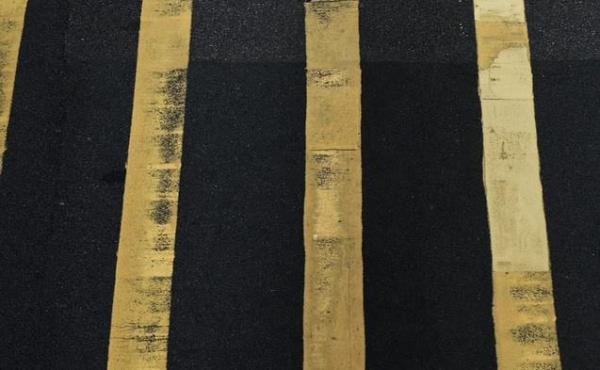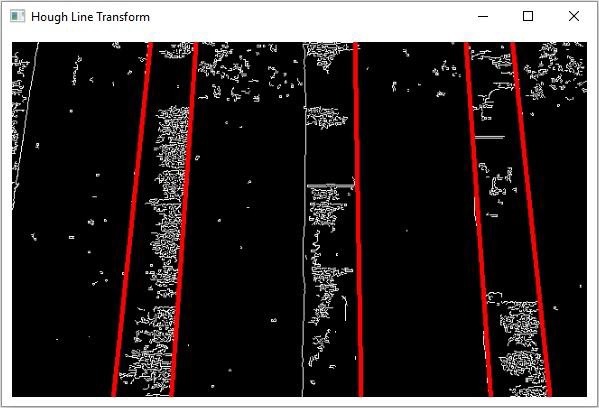使用Java实现OpenCV霍夫线变换。
您可以使用霍夫线变换检测给定图像中的直线。OpenCV中提供了两种霍夫线变换,即标准霍夫线变换和概率霍夫线变换。
您可以使用Imgproc类的**HoughLines()**方法应用标准霍夫线变换。此方法接受:
两个Mat对象,分别表示源图像和存储线参数(r, Φ)的向量。
两个双精度变量,分别表示参数r(像素)和Φ(弧度)的分辨率。
一个整数,表示“检测”一条线所需的最小交叉点数。
您可以使用Imgproc类的**HoughLinesP()**方法应用概率霍夫线变换(参数相同)。
您可以使用Imgproc类的**Canny()**方法检测给定图像中的边缘。此方法接受:
两个Mat对象,分别表示源图像和目标图像。
两个双精度变量,用于保存阈值。
要使用Canny边缘检测器检测给定图像的边缘:
使用Imgcodecs类的imread()方法读取源图像的内容。
使用Imgproc类的cvtColor()方法将其转换为灰度图像。
使用Imgproc类的blur()方法,以内核值为3模糊结果(灰度)图像。
使用Imgproc类的canny()方法对模糊图像应用Canny边缘检测算法。
创建一个所有值为0的空矩阵。
使用Mat类的copyTo()方法将检测到的边缘添加到其中。
示例
import java.awt.Image;
import java.awt.image.BufferedImage;
import java.io.IOException;
import javafx.application.Application;
import javafx.embed.swing.SwingFXUtils;
import javafx.scene.Group;
import javafx.scene.Scene;
import javafx.scene.image.ImageView;
import javafx.scene.image.WritableImage;
import javafx.stage.Stage;
import org.opencv.core.Core;
import org.opencv.core.CvType;
import org.opencv.core.Mat;
import org.opencv.core.Point;
import org.opencv.core.Scalar;
import org.opencv.highgui.HighGui;
import org.opencv.imgcodecs.Imgcodecs;
import org.opencv.imgproc.Imgproc;
public class HoughLineTransform extends Application {
public void start(Stage stage) throws IOException {
//Loading the OpenCV core library
System.loadLibrary( Core.NATIVE_LIBRARY_NAME );
String file ="D:\Images\road4.jpg";
Mat src = Imgcodecs.imread(file);
//Converting the image to Gray
Mat gray = new Mat();
Imgproc.cvtColor(src, gray, Imgproc.COLOR_RGBA2GRAY);
//Detecting the edges
Mat edges = new Mat();
Imgproc.Canny(gray, edges, 60, 60*3, 3, false);
// Changing the color of the canny
Mat cannyColor = new Mat();
Imgproc.cvtColor(edges, cannyColor, Imgproc.COLOR_GRAY2BGR);
//Detecting the hough lines from (canny)
Mat lines = new Mat();
Imgproc.HoughLines(edges, lines, 1, Math.PI/180, 150);
for (int i = 0; i < lines.rows(); i++) {
double[] data = lines.get(i, 0);
double rho = data[0];
double theta = data[1];
double a = Math.cos(theta);
double b = Math.sin(theta);
double x0 = a*rho;
double y0 = b*rho;
//Drawing lines on the image
Point pt1 = new Point();
Point pt2 = new Point();
pt1.x = Math.round(x0 + 1000*(-b));
pt1.y = Math.round(y0 + 1000*(a));
pt2.x = Math.round(x0 - 1000*(-b));
pt2.y = Math.round(y0 - 1000 *(a));
Imgproc.line(cannyColor, pt1, pt2, new Scalar(0, 0, 255), 3);
}
//Converting matrix to JavaFX writable image
Image img = HighGui.toBufferedImage(cannyColor);
WritableImage writableImage= SwingFXUtils.toFXImage((BufferedImage) img, null);
//Setting the image view
ImageView imageView = new ImageView(writableImage);
imageView.setX(10);
imageView.setY(10);
imageView.setFitWidth(575);
imageView.setPreserveRatio(true);
//Setting the Scene object
Group root = new Group(imageView);
Scene scene = new Scene(root, 595, 400);
stage.setTitle("Hough Line Transform");
stage.setScene(scene);
stage.show();
}
public static void main(String args[]) {
launch(args);
}
}输入图像

输出
执行上述操作后,将产生以下输出:


广告

 数据结构
数据结构 网络
网络 关系数据库管理系统 (RDBMS)
关系数据库管理系统 (RDBMS) 操作系统
操作系统 Java
Java iOS
iOS HTML
HTML CSS
CSS Android
Android Python
Python C语言编程
C语言编程 C++
C++ C#
C# MongoDB
MongoDB MySQL
MySQL Javascript
Javascript PHP
PHP